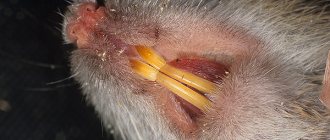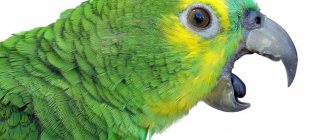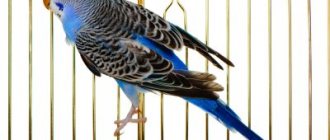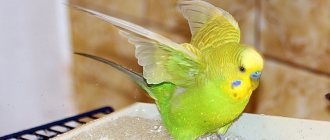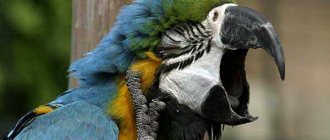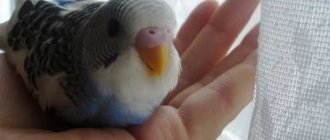Curious, cheerful, energetic - all these epithets belong to pet parrots. They give a lot of positive things, and against this background the real problem seems incredible: how to wean a parrot from biting. However, daily attacks by birds on their owners are not uncommon. Because of this behavior, discomfort arises in people, but even more so in birds, who have to live indoors, without games or walks. You will learn from the article how to understand why a tame parrot bites and how to stop it.
Introduction
Without a doubt, birds make wonderful pets. However, it happens that their behavior can be annoying and even upset their owners. When people hear that I have Amazons, many of them say, “Oh, Amazons are beautiful birds. But I would prefer cockatoos because they don't bite." I don't want to disappoint them, but all birds can bite. And to the question: why does a parrot bite, you can answer this way. This is rather an individual problem and does not depend on the type of bird.
Two steps to eliminate fear
- All of the above and other fears are justified and natural. But owners can give their parrot a sense of security and calm by gradually training their feathered friend. It is important to understand why the parrot is afraid! Watching a bird and understanding the causes of phobias can radically change the situation in a positive direction. First of all, you need to get the bird to trust you. For some birds this is a fairly slow process. And the owner needs patience and time to let his pet get comfortable.
- The best way to combat the fear of new things is through positive reinforcement. The essence of positive reinforcement is that the owner of the bird reinforces the positive emotions of the pet during any correct action by praise, favorite things or treats for the birds.
Is it always good that a bird doesn't bite?
Several years ago, a wild-caught parrot was brought to the clinic where I worked as a veterinary assistant to determine its sex. His owner told me that he had never had a kinder bird. And she never even tried to bite him. And indeed: when I took the bird in a towel, it didn’t even try to escape, much less bite me. I immediately reported this to the veterinarian because it alarmed me. It is not normal for a bird to remain so calm when a stranger picks it up in a towel and holds it. When the veterinarian began to draw blood from the bird, it turned out to be pale pink. The reason that the bird never tried to pinch or bite anyone was because it was sick. She was already very weak due to her illness and eventually died three days after her visit to the clinic.
Summary: it’s normal for owners to wonder why a parrot bites and how to stop it from doing so. You should be especially concerned if the bird behaves differently from other members of its species. Many birds may be good-natured and not bite only because they are, in fact, seriously ill.
The essence of the problem
The appearance of a parrot makes some adjustments to the breeder’s everyday life. Proper care of birds requires daily cleaning of the enclosure, as well as changing water and food. Incorrect living conditions, lack of disinfection, imbalance in diet lead to various pet diseases.
An inexperienced owner should know that after purchasing a parrot, the bird goes through an adaptation period. Depending on the nature and type of bird, this period takes different times. On average - 14 days.
Other rules
Unlike people, birds have different norms and rules of behavior. It is not human nature to bite. But in the world of birds, this is one of the accepted methods of communication. Sometimes, a bird can bite off another bird's toe and cause even more serious injuries to it. However, most of them cause little, if any, harm to other birds with their bites. Therefore, do not get overly upset, worrying about why the parrot bites and what to do. Remember that this is a feature of their communication. The birds have dense down and smooth plumage, which serve as a kind of protection against bites and lead to the fact that they only occur in passing. Unlike birds, humans do not have the same protection as feathers. The bite hits the skin directly, leaving scars, bruises or cuts. Bites can result in a simple scratch, or they can result in bone fracture.
About three times a year I get very strong bites. Usually it’s my fault for not following my own advice. My troupe of birds, called the Delightful Amazons, perform daily stunts that put me in quite a vulnerable position. My birds are known not only for their artistic abilities, but also for their gentle dispositions. Usually about 250 people pick them up after each performance. And in 10 years of work they have never bitten anyone. Although parrots are the best birds to bite.
One of the best ways to avoid a bite is to know what can trigger it. Understanding why a bird bites and what might trigger it to do so will help you avoid many injuries. You just need to be attentive to the bird to prevent it from biting you.
Parrot training
Taming a parrot is one way to prevent attacks from it. A bird that is not afraid of human hands is less likely to show aggression, since it trusts its owner more and bites less.
A small parrot needs to be taught from early childhood to sit on your finger. With proper patience, anyone can do this. You need to put your finger on the parrot's chest and push the pet slightly. He will lose his balance and grab onto it.
The main thing is not to stop after the first lesson if it turns out to be unsuccessful. Sooner or later the bird will perform the necessary action, and it will really like sitting on your finger. In the future, this will prevent the occurrence of such problems as biting or painfully pinching the owner's hands, face and ears with its beak.
When the parrot gets used to sitting on your finger and taking food from your hands, you can move on. The task at this stage is to show the bird that it can be removed from the cage using your finger. First you need to stay close to the cage - for the parrot this is the safest place in the house. Then you should take the bird some distance away from it. The purpose of the classes is to show the parrot that he can trust his owner, and ultimately to wean him from biting (or prevent the development of such a habit).
You need to train a parrot only in those moments when he is in the mood to do so. As soon as the bird begins to show indifference to what is happening, the lesson must be stopped - there will be no benefit from it anyway.
Causes of bites
Puberty of birds
Most people do not experience problems with birds until the birds reach sexual maturity. And only then the owners wonder why the parrot became aggressive and bites. I have seen cute chicks turn into real monsters when they reach this stage of development. In this case, aggression is usually limited to the breeding season, after which the bird again becomes affectionate as before. But if the bird realizes that by biting you it can get its way, the hormonal behavior-driven bites may not stop and become a serious problem in the future.
Natural features
In their natural habitat, birds constantly explore the world around them, in search of food and favorable living conditions.
And they can “feel” an object only with the help of their beak and tongue. But it is important to remember that in this case, attempts to gnaw on the bars of the cage will be infrequent and the periodic addition of new, interesting, safe toys will solve this issue
The instincts are to grind down the beak, because it does not stop growing throughout the pet’s life. The parrot should always have freely available objects that help with this: pieces of wood or tree bark, pieces of limestone or sandstone. If the bird still prefers rods, then you need to take care of the safety of this material; stainless steel without a color coating is best. This will protect him from eating harmful substances. If the beak grows excessively, only veterinary specialists can help.
Parrot control
The beak, claws and wing feathers have grown
Trimming the wing feathers can help you tame your bird and also keep it from flying out of a window or into a wall. As a bird's claws and wing feathers grow, it may become more aggressive.
Direct look into the eyes
Some parrots will not bite you as long as you look them in the eye. But as soon as you look away, they may bite you. This is because some birds get wound up quickly and only need a split second to release their emotions. You should also keep in mind that an Amazon, under the influence of hormones, may consider your direct gaze into the eyes as a challenge and a threat to him personally, and respond to this. He may attack you. After all, the parrot believes that you are going to violate the boundaries of its territory or encroach on its partner.
Bare legs
Some birds are quite observant. Therefore, they can easily notice when you are most vulnerable to their bites. I have seen birds that behaved perfectly until the owners took off their shoes. The foot chase will continue until you put your boots back on or are out of the pet's reach.
More than one bird in hand
Amazons may become jealous or start fighting for their territory if you hold two birds in your hands at once. You will not be able to control both birds at the same time, thereby giving one the opportunity to bite the other or you. Two parrots mean twice the chance of being bitten.
The pleasure of biting
When I first encountered my Amazon, I was warned that he was a “difficult bird.” And this, indeed, was not an exaggeration. For the first 18 months he bit me every day. Before that, he bit through the nostril of the previous owner and hung on it like an earring. He completely bit through my lip and attacked me in the eye. He also gave my arms scars from my wrists to my elbows. He was ready to scalp me. The parrot was very talented and creative in biting me. He took great pleasure in confronting the man.
When a stranger entered the room, the parrot would become all disheveled, bow its head low and sit close to the bars of the cage. At the same time, he said in the sweetest voice: “Come here. Come here, good boy." I always warned people not to touch it. But his modest appearance and soft voice did their job: people forgot about it. Stupid in their naivety, they reached into the cage with their fingers to scratch his head. Instantly he grabbed the finger with his foot and pressed it so tightly to the bars of the cage that it was no longer possible to pull it out. And then he bit and bit and bit him. The parrot really liked this game, but few others found it funny. Few birds have such talents. Be careful with smart birds: smart parrots are often the ones who bite.
These aren't the only things that can cause or encourage biting. Each bird is individual, and the list goes on and on. If a bird bites you, think about why it did it. If you understand the reason, it will help you avoid being bitten in the future.
Thus, the article has come to an end. I hope you were able to gain useful information for yourself, understand why parrots sometimes bite and how to wean them from it. Also, please share in the comments, have you encountered problems with bites? How did you deal with them? I am sure that our readers will find your personal experience interesting and useful.
Incorrectly reinforced behavior
Raising a parrot, like any other pet, is a painstaking process. They remember speech and commands. And if you don’t teach them something, they’ll figure it out on their own. For example, you taught him to sit on your hand, but before he sits down, the feathered friend “tastes you”, why do parrots bite in this case? This action is determined by nature; before climbing onto a branch, they always determine the strength with their beak. This is an instinct and in this case it will not be possible to completely wean a budgie from biting. But the force of the bite can be controlled. Such a “test” of non-aggression may initially lead to simply an unpleasant feeling, which was most likely caused by your wrong actions.
When should you be wary?
It was already mentioned above that bites from an exotic bird can be an absolutely normal reaction. However, there are a number of factors that you should be wary of.
- The bird bit once, the man safely took his hands away from it. But attempts to hurt him continue.
- She behaves aggressively all the time.
- All possible methods of solving problems do not help.
- She begins to attack other parrots who are in a cage or aviary with her for no reason.
All this may indicate that the pet is sick or there are not enough vitamins in its body. It is necessary to show him to an ornithologist to identify the problem and prescribe treatment.

